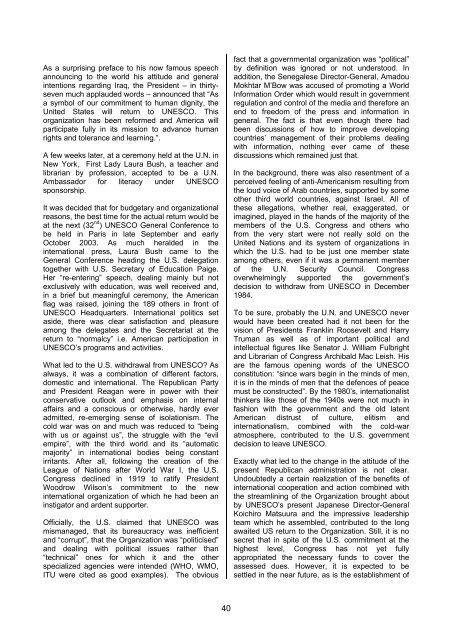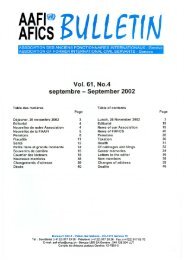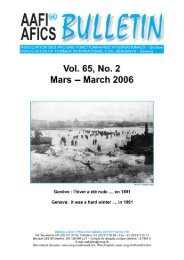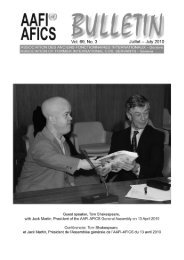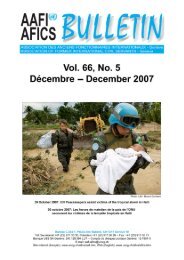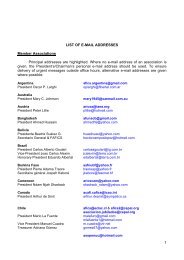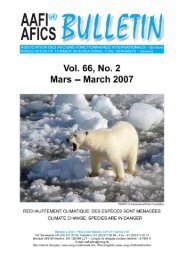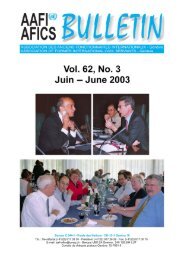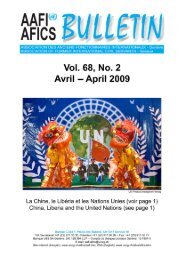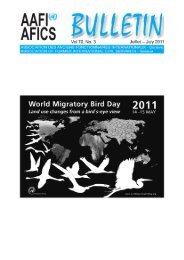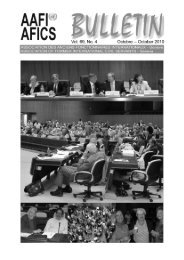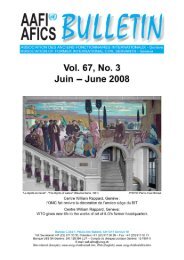nouvelles de notre association - aafi-afics - UNOG
nouvelles de notre association - aafi-afics - UNOG
nouvelles de notre association - aafi-afics - UNOG
You also want an ePaper? Increase the reach of your titles
YUMPU automatically turns print PDFs into web optimized ePapers that Google loves.
As a surprising preface to his now famous speech<br />
announcing to the world his attitu<strong>de</strong> and general<br />
intentions regarding Iraq, the Presi<strong>de</strong>nt – in thirtyseven<br />
much applau<strong>de</strong>d words – announced that “As<br />
a symbol of our commitment to human dignity, the<br />
United States will return to UNESCO. This<br />
organization has been reformed and America will<br />
participate fully in its mission to advance human<br />
rights and tolerance and learning.”.<br />
A few weeks later, at a ceremony held at the U.N. in<br />
New York, First Lady Laura Bush, a teacher and<br />
librarian by profession, accepted to be a U.N.<br />
Ambassador for literacy un<strong>de</strong>r UNESCO<br />
sponsorship.<br />
It was <strong>de</strong>ci<strong>de</strong>d that for budgetary and organizational<br />
reasons, the best time for the actual return would be<br />
at the next (32 nd ) UNESCO General Conference to<br />
be held in Paris in late September and early<br />
October 2003. As much heral<strong>de</strong>d in the<br />
international press, Laura Bush came to the<br />
General Conference heading the U.S. <strong>de</strong>legation<br />
together with U.S. Secretary of Education Paige.<br />
Her “re-entering” speech, <strong>de</strong>aling mainly but not<br />
exclusively with education, was well received and,<br />
in a brief but meaningful ceremony, the American<br />
flag was raised, joining the 189 others in front of<br />
UNESCO Headquarters. International politics set<br />
asi<strong>de</strong>, there was clear satisfaction and pleasure<br />
among the <strong>de</strong>legates and the Secretariat at the<br />
return to “normalcy” i.e. American participation in<br />
UNESCO’s programs and activities.<br />
What led to the U.S. withdrawal from UNESCO? As<br />
always, it was a combination of different factors,<br />
domestic and international. The Republican Party<br />
and Presi<strong>de</strong>nt Reagan were in power with their<br />
conservative outlook and emphasis on internal<br />
affairs and a conscious or otherwise, hardly ever<br />
admitted, re-emerging sense of isolationism. The<br />
cold war was on and much was reduced to “being<br />
with us or against us”, the struggle with the “evil<br />
empire”, with the third world and its “automatic<br />
majority” in international bodies being constant<br />
irritants. After all, following the creation of the<br />
League of Nations after World War I, the U.S.<br />
Congress <strong>de</strong>clined in 1919 to ratify Presi<strong>de</strong>nt<br />
Woodrow Wilson’s commitment to the new<br />
international organization of which he had been an<br />
instigator and ar<strong>de</strong>nt supporter.<br />
Officially, the U.S. claimed that UNESCO was<br />
mismanaged, that its bureaucracy was inefficient<br />
and “corrupt”, that the Organization was “politicised”<br />
and <strong>de</strong>aling with political issues rather than<br />
“technical” ones for which it and the other<br />
specialized agencies were inten<strong>de</strong>d (WHO, WMO,<br />
ITU were cited as good examples). The obvious<br />
fact that a governmental organization was “political”<br />
by <strong>de</strong>finition was ignored or not un<strong>de</strong>rstood. In<br />
addition, the Senegalese Director-General, Amadou<br />
Mokhtar M’Bow was accused of promoting a World<br />
Information Or<strong>de</strong>r which would result in government<br />
regulation and control of the media and therefore an<br />
end to freedom of the press and information in<br />
general. The fact is that even though there had<br />
been discussions of how to improve <strong>de</strong>veloping<br />
countries’ management of their problems <strong>de</strong>aling<br />
with information, nothing ever came of these<br />
discussions which remained just that.<br />
In the background, there was also resentment of a<br />
perceived feeling of anti-Americanism resulting from<br />
the loud voice of Arab countries, supported by some<br />
other third world countries, against Israel. All of<br />
these allegations, whether real, exaggerated, or<br />
imagined, played in the hands of the majority of the<br />
members of the U.S. Congress and others who<br />
from the very start were not really sold on the<br />
United Nations and its system of organizations in<br />
which the U.S. had to be just one member state<br />
among others, even if it was a permanent member<br />
of the U.N. Security Council. Congress<br />
overwhelmingly supported the government’s<br />
<strong>de</strong>cision to withdraw from UNESCO in December<br />
1984.<br />
To be sure, probably the U.N. and UNESCO never<br />
would have been created had it not been for the<br />
vision of Presi<strong>de</strong>nts Franklin Roosevelt and Harry<br />
Truman as well as of important political and<br />
intellectual figures like Senator J. William Fulbright<br />
and Librarian of Congress Archibald Mac Leish. His<br />
are the famous opening words of the UNESCO<br />
constitution: “since wars begin in the minds of men,<br />
it is in the minds of men that the <strong>de</strong>fences of peace<br />
must be constructed”. By the 1980’s, internationalist<br />
thinkers like those of the 1940s were not much in<br />
fashion with the government and the old latent<br />
American distrust of culture, elitism and<br />
internationalism, combined with the cold-war<br />
atmosphere, contributed to the U.S. government<br />
<strong>de</strong>cision to leave UNESCO.<br />
Exactly what led to the change in the attitu<strong>de</strong> of the<br />
present Republican administration is not clear.<br />
Undoubtedly a certain realization of the benefits of<br />
international cooperation and action combined with<br />
the streamlining of the Organization brought about<br />
by UNESCO’s present Japanese Director-General<br />
Koichiro Matsuura and the impressive lea<strong>de</strong>rship<br />
team which he assembled, contributed to the long<br />
awaited US return to the Organization. Still, it is no<br />
secret that in spite of the U.S. commitment at the<br />
highest level, Congress has not yet fully<br />
appropriated the necessary funds to cover the<br />
assessed dues. However, it is expected to be<br />
settled in the near future, as is the establishment of<br />
40


